#ancient myths retold
Text
I couldn't help but sneak this timeless quote into chapter 7 of AtMotS
“Don’t you know, Feyre darling, death cannot stop true love. All it can do is delay it a while.”
@the-lonelybarricade, you'll appreciate this one, I think.
#acotar#the princess bride#AtMotS#at the mercy of the stars#it's getting there guys#little by little#feysand fic#feysand#feyre archeron#rhysand#ancient myths retold
18 notes
·
View notes
Text
Elektra by Jennifer Saint
There’s no drama like ancient Greek drama – they’re the original drama queens and kings and many of them were indeed kings and queens, like ancient Kardashians whatever they did changed lives.
Even if you, like me, were interested in Greek mythology at some point, you may not remember Elektra. She’s a minor player in one of the best-known tales of this ancient world: the story of Troy. But the…
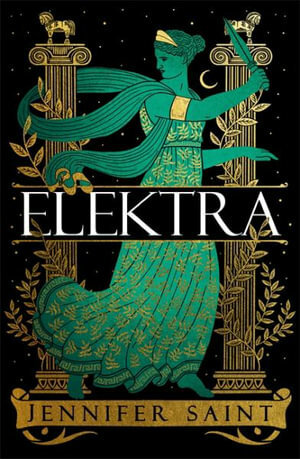
View On WordPress
#ancient Greece#book review#Cassandra#Clytemnestra#Elektra#female point of view#first person narrator#Greek myth#Jennifer Saint#myth retold#Troy
2 notes
·
View notes
Text
In defense of retellings & reimaginings
I'm not going to respond to the post that sparked this, because honestly, I don't really feel like getting in an argument, and because it's only vaguely even about the particular story that the other post discussed. The post in question objected to retellings of the Rape of Persephone which changed important elements of the story -- specifically, Persephone's level of agency, whether she was kidnapped, whether she ate seeds out of hunger, and so on. It is permissible, according to this thesis, to 'fill in empty spaces,' but not to change story elements, because 'those were important to the original tellers.' (These are acknowledged paraphrases, and I will launch you into the sun if you nitpick this paragraph.)
I understand why to the person writing that, that perspective is important, and why they -- especially as a self-described devotee of Persephone -- feel like they should proscribe boundaries around the myth. It's a perfectly valid perspective to use when sorting -- for example -- which things you choose to read. If you choose not to read anything which changes the elements which you feel are important, I applaud you.
However, the idea that one should only 'color in missing pieces,' especially when dealing with stories as old, multi-sourced, and fractional as ancient myths, and doing so with the argument that you shouldn't change things because those base elements were important to the people who originally crafted the stories, misses -- in my opinion -- the fundamental reason we tell stories and create myths in the first place.
Forgive me as I get super fucking nerdy about this. I've spent the last several years of my life wrestling with the concept of myths as storytelling devices, universality of myths, and why myths are even important at all as part of writing on something like a dozen books (a bunch of which aren't out yet) for a game centered around mythology. A lot of the stuff I've written has had to wrestle with exactly this concept -- that there is a Sacred Canon which cannot be disrupted, and that any disregard of [specific story elements] is an inexcusable betrayal.
Myths are stories we tell ourselves to understand who we are and what's important to us as individuals, as social groups, and as a society. The elements we utilize or change, those things we choose to include and exclude when telling and retelling a story, tell us what's important to us.
I could sit down and argue over the specific details which change over the -- at minimum -- 1700 years where Persephone/Kore/Proserpina was actively worshiped in Greek and Roman mystery cults, but I actually don't think those variations in specific are very important. What I think is important, however, is both the duration of her cults -- at minimum from 1500 BCE to 200CE -- and the concept that myths are stories we tell ourselves to understand who we are and what's important to us.
The idea that there was one, or even a small handful, of things that were most important to even a large swath of the people who 'originally' told the store of the Rape of Persephone or any other 'foundational' myth of what is broadly considered 'Western Culture,' when those myths were told and retold in active cultic worship for 1700 years... that seems kind of absurd to me on its face. Do we have the same broad cultural values as the original tellers of Beowulf, which is only (heh) between 1k-1.3k years old? How different are our marital traditions, our family traditions, and even our language? We can, at best, make broad statements, and of inclusive necessity, those statements must be broad enough as to lose incredible amounts of specificity. In order to make definitive, specific statements, we must leave out large swaths of the people to whom this story, or any like it, was important.
To move away from the specific story brought up by the poster whose words spun this off, because it really isn't about that story in particular, let's use The Matter of Britain/Arthuriana as our framing for the rest of this discussion. If you ask a random nerd on Tumblr, they'd probably cite a handful of story elements as essential -- though of course which ones they find most essential undoubtedly vary from nerd to nerd -- from the concept that Camelot Always Falls to Gawain and the Green Knight, Percival and the grail, Lancelot and Guinevere...
... but Lancelot/Guinevere and Percival are from Chrétien de Troyes in the 12th century, some ~500 years after Taliesin's first verses. Lancelot doesn't appear as a main character at all before de Troyes, and we can only potentially link him to characters from an 11th century story (Culhwch and Olwen) for which we don't have any extant manuscripts before the 15th century. Gawain's various roles in his numerous appearances are... conflicting characterizations at best.
The point here is not just that 'the things you think are essential parts of the story are not necessarily original,' or that 'there are a lot of different versions of this story over the centuries,' but also 'what you think of as essential is going to come back to that first thesis statement above.' What you find important about The Matter of Britain, and which story elements you think can be altered, filed off or filled in, will depend on what that story needs to tell you about yourself and what's important to you.
Does creating a new incarnation of Arthur in which she is a diasporic lesbian in outer space ruin a story originally about Welsh national identity and chivalric love? Does that disrespect the original stories? How about if Arthur is a 13th century Italian Jew? Does it disrespect the original stories if the author draws deliberate parallels between the seduction of Igerne and the story of David and Bathsheba?
Well. That depends on what's important to you.
Insisting that the core elements of a myth -- whichever elements you believe those to be -- must remain static essentially means 'I want this myth to stagnate and die.' Maybe it's because I am Jewish, and we constantly re-evaluate every word in Torah, over and over again, every single year, or maybe it's because I spend way, way too much time thinking about what's valuable in stories specifically because I write words about these concepts for money, but I don't find these arguments compelling at all, especially not when it comes to core, 'mainstream' mythologies. These are tools in the common toolbox, and everybody has access to them.
More important to me than the idea that these core elements of any given story must remain constant is, to paraphrase Dolly Parton, that a story knows what it is and does it on purpose. Should authors present retellings or reimaginings of the Rape of Persephone or The Matter of Britain which significantly alter historically-known story elements as 'uncovered' myths or present them as 'the real and original' story? Absolutely not. If someone handed me a book in which the new Grail was a limited edition Macklemore Taco Bell Baja Blast cup and told me this comes directly from recently-discovered 6th century writings of Taliesin, I would bonk them on the head with my hardcover The Once & Future King. Of course that's not the case, right?
But the concept of canon, historically, in these foundational myths has not been anything like our concept of canon today. Canon should function like a properly-fitted corset, in that it should support, not constrict, the breath in the story's lungs. If it does otherwise, authors should feel free to discard it in part or in whole.
Concepts of familial duty and the obligation of marriage don't necessarily resonate with modern audiences the way that the concept of self-determination, subversion of unreasonable and unjustified authority, and consent do. That is not what we, as a general society, value now. If the latter values are the values important to the author -- the story that the author needs to tell in order to express who they are individually and culturally and what values are important to them* -- then of course they should retell the story with those changed values. That is the point of myths, and always has been.
Common threads remain -- many of us move away from family support regardless of the consent involved in our relationships, and life can be terrifying when you're suddenly out of the immediate reach and support of your family -- because no matter how different some values are, essential human elements remain in every story. It's scary to be away from your mother for the first time. It's scary to live with someone new, in a new place. It's intimidating to find out that other people think you have a Purpose in life that you need to fulfill. It's hard to negotiate between the needs of your birth family and your chosen family.
None of this, to be clear, is to say that any particular person should feel that they need to read, enjoy, or appreciate any particular retelling, or that it's cool, hip and groovy to misrepresent your reworking of a myth as a 'new secret truth which has always been there.' If you're reworking a myth, be truthful about it, and if somebody told you 'hey did you know that it really -- ' and you ran with that and find out later you were wrong, well, correct the record. It's okay to not want to read or to not enjoy a retelling in which Arthur, Lancelot and Guinevere negotiate a triad and live happily ever after; it's not really okay to say 'you can't do that because you changed a story element which I feel is non-negotiable.' It's okay to say 'I don't think this works because -- ' because part of writing a story is that people are going to have opinions on it. It's kind of weird to say 'you're only allowed to color inside these lines.'
That's not true, and it never has been. Greek myths are not from a closed culture. Roman myths are not sacrosanct. There are plenty of stories which outsiders should leave the hell alone, but Greek and Roman myths are simply not on that list. There is just no world in which you can make an argument that the stories of the Greek and Roman Empires are somehow not open season to the entire English-speaking world. They are the public-est of domain.
You don't have to like what people do with it, but that doesn't make people wrong for writing it, and they certainly don't have to color within the lines you or anyone else draws. Critique how they tell the story, but they haven't committed some sort of cultural treachery by telling the stories which are important to them rather than the stories important to someone 2500 years dead.
****
*These are not the only reasons to tell a story and I am not in any way saying that an author is only permitted to retell a story to express their own values. There are as many reasons to tell a story as there are stories, and I don't really think any reason to create fiction is more or less valid than any other. I am discussing, specifically, the concept of myths as conveyors of essential cultural truths.
2K notes
·
View notes
Text
Cursed Eyes Find Blind Love
"I wasn't always blind, but I could not die, and I wanted to see my wife's enchanting eyes one more time.
I know her hair is serpents and that scales cover her face, but her smile is still the same.
Every time I hear her laugh, I still see the enchantingly beautiful woman I married.
I met her on my travels. It was a small village I was staying in for the night on my way to Athens. She was dancing, celebrating her sister's wedding. The first thing I saw was her eyes. They were like an emerald green lagoon sprinkled with the brightest stars. She looked at me and smiled. I felt my body turn to stone with awe.
She loves stories which are great for me because I have a million lifetimes of them. Every night sunset is over, and bats start to fly. She lies in my arms and begs for a story from my travels. I always have one.
I am the only one who can go out to shop, and every time I make sure to buy my lovely wife all the best clothes and furniture.
I know that it will never end, but for her, I'd do it a hundred times over.
0 notes
Text
The EPIC Circe Saga making Odysseus' love for Penelope what ultimately saves him from Circe just healed a massive hole in my heart.
Because YES the Odyssey like all of Ancient Greek Mythology has a misogynist streak a mile wide, but that primarily comes down to the written text, preserved by Athens--no one hates women more than Athens--and translated into English for centuries by sexist men who wanted to see a powerful woman tamed by a man.
But the Odyssey and the Iliad come from ancient oral tradition. They were told and retold and everyone, EVERYONE, got a say in how to interpret them. Why can't we?
Why can't the story be: Odysseus' love for his wife and his family is what saves him. Hermes tells him the only way to protect himself from Circe is to seduce her. Agamemnon, who lied and betrayed his wife, warns him that trusting women will get him killed. But Odysseus doesn't listen. Instead, he passes Circe's test of character where others failed. He trusts Penelope and does right by her and she does the same for him. The secret of their marriage bed serves as a symbol of loyalty and commitment upheld by them both, not just Penelope.
Why can't it be that? Greek Myth is already brutal, why do we have to willfully make it more so?
#I will never stop losing my mind over the iliad and the odyssey#odysseus and penelope are the original power couple#greek mythology#epic the musical#epic the circe saga#odysseus#penelope#circe#the odyssey#homer
969 notes
·
View notes
Text
Okay, breaking my principles hiatus again for another fanfic rant despite my profound frustration w/ Tumblr currently:
I have another post and conversation on DW about this, but while pretty much my entire dash has zero patience with the overtly contemptuous Hot Fanfic Takes, I do pretty often see takes on Fanfiction's Limitations As A Form that are phrased more gently and/or academically but which rely on the same assumptions and make the same mistakes.
IMO even the gentlest, and/or most earnest, and/or most eruditely theorized takes on fanfiction as a form still suffer from one basic problem: the formal argument does not work.
I have never once seen a take on fanfiction as a form that could provide a coherent formal definition of what fanfiction is and what it is not (formal as in "related to its form" not as in "proper" or "stuffy"). Every argument I have ever seen on the strengths/weaknesses of fanfiction as a form vs original fiction relies to some extent on this lack of clarity.
Hence the inevitable "what about Shakespeare/Ovid/Wide Sargasso Sea/modern takes on ancient religious narratives/retold fairy tales/adaptation/expanded universes/etc" responses. The assumptions and assertions about fanfiction as a form in these arguments pretty much always should apply to other things based on the defining formal qualities of fanfic in these arguments ("fanfiction is fundamentally X because it re-purposes pre-existing characters and stories rather than inventing new ones" "fanfiction is fundamentally Y because it's often serialized" etc).
Yet the framing of the argument virtually always makes it clear that the generalizations about fanfic are not being applied to Real Literature. Nor can this argument account for original fics produced within a fandom context such as AO3 that are basically indistinguishable from fanfic in every way apart from lacking a canon source.
At the end of the day, I do not think fanfic is "the way it is" because of any fundamental formal qualities—after all, it shares these qualities with vast swaths of other human literature and art over thousands of years that most people would never consider fanfic. My view is that an argument about fanfic based purely on form must also apply to "non-fanfic" works that share the formal qualities brought up in the argument (these arguments never actually apply their theories to anything other than fanfic, though).
Alternately, the formal argument could provide a definition of fanfic (a formal one, not one based on judgment of merit or morality) that excludes these other kinds of works and genres. In that case, the argument would actually apply only to fanfic (as defined). But I have never seen this happen, either.
So ultimately, I think the whole formal argument about fanfic is unsalvageably flawed in practice.
Realistically, fanfiction is not the way it is because of something fundamentally derived from writing characters/settings etc you didn't originate (or serialization as some new-fangled form, lmao). Fanfiction as a category is an intrinsically modern concept resulting largely from similarly modern concepts of intellectual property and auteurship (legally and culturally) that have been so extremely normalized in many English-language media spaces (at the least) that many people do not realize these concepts are context-dependent and not universal truths.
Fanfic does not look like it does (or exist as a discrete category at all) without specifically modern legal practices (and assumptions about law that may or may not be true, like with many authorial & corporate attempts to use the possibility of legal threats to dictate terms of engagement w/ media to fandom, the Marion Zimmer Bradley myth, etc).
Fanfic does not look like it does without the broader fandom cultures and trends around it. It does not look like it does without the massive popularity of various romance genres and some very popular SF/F. It does not look like it does without any number of other social and cultural forces that are also extremely modern in the grand scheme of things.
The formal argument is just so completely ahistorical and obliviously presentist in its assumptions about art and generally incoherent that, sure, it's nicer when people present it politely, but it's still wrong.
#this is probably my most pretentious fanfiction defense squad post but it's difficult to express in other terms#like. people talking about ao3 house style (not always by name but clearly referring to it) as a result of fanfic as a form#and not the social/cultural effect of ao3 as a fandom space#you don't get ao3 house style without ao3 itself and you don't get ao3 without strikethrough and livejournal etc#and you don't get those without authors and corporations trying to exercise control over fic based on law (often us law) & myths about law#and you don't get those without distinctly modern concepts of intellectual property and copyright#none of those things have fuck all to do with form!#anghraine rants#fanfiction#general fanwank#long post#thinking about this partly because the softer & gentler versions of fanfic discourse keep crossing my dash#and partly because i've written like 30 pages about a playwright i adore who was just not very good at 'original fiction' as we'd define it#both his major works are ... glorified rpf in our context but splendid tragedies in his#and the idea of categorizing /anything/ in that era by originality of conception rather than comedy/tragedy/etc would be buckwild#ivory tower blogging#anghraine's meta
90 notes
·
View notes
Text
⎯⎯ 𝐈𝐍𝐓𝐑𝐎𝐃𝐔𝐂𝐈𝐍𝐆 . . MIRACULOUS
ACADEMY DR . ˳𐑞⠀𓎠 헌이 ₊ 📔




L’Académie Royale Feng Dubois’ history is foggy. Known to have appeared suddenly in the fourteenth century, the school was rumoured to raise powerful heroes with an old magic.
These heroes would come to protect their assigned cities from villains summoned from a darker magic, defeated before they could even imagine their plans falling through. This school would teach their students to become powerful. Magical. Miraculous. But, it is said the academy suddenly vanished, along with the heroes that came from it.
The story was told and retold until it became a common myth that parents would tell their children in order for them to be on their best behaviour. “Only the best students are accepted into l’Académie Royale, so you better get your rest and study well.”
Now, the school is almost entirely unheard of. Too unrealistic. Some still live on the thread of hope that the school will reappear, followed by receiving an acceptance letter in the mail.
When an ancient building suddenly appears in the rural area of France with a group of staff members claiming to be from ancient times, it raises more than a few questions. Is this really l’Académie Royale? Were these teachers and faculty members frozen in time? Why appear now, after so many years?
Anyway, it’s not like it’ll affect me, I’m just visiting relatives in Paris for a few weeks…




Rivera Rose Fathom, better known as River, is expecting another normal visit to her uncle's with her twin, but is unknowingly ropped into another eight years of school at some not-so mythical academy
ㅤㅤㅤㅤㅤৎ ۟ 𓂂 ABOUT ME !
Name — Rivera Rose Fathom
Nicknames — River, Riv, Rose
Race — Black-White
Sexe — Female
Pronouns — She/Her
Sexuality — Pansexual
Birthday — July 4, 2005
Age — 18 years old
Big Three — ☼ Cancer ☾ Gemini ↑ Taurus
Place of Birth — London, England
Current Residence — Paris, France




Students from all around the world are accepted into l'Académie Royale, regardless of their background or status. They're all brought together by the same curiosity and admiration toward this magical school.
ㅤㅤㅤㅤㅤৎ ۟ 𓂂 OTHER FACTS !
Learn about the history of the school—and Miraculous powers—here!!
There's a special magic attached to the school so that everyone can understand each other no matter what language they're speaking (Kinda like The Good Place)
A lot of the scripted in students are idols from this reality — some keep their idol job, others are just regular people
I made a form for people to script themselves in, too!!!
Students learn magic outside of using the miraculous, too, but it's all connected to its higher power
The school is divided into four houses: Elementalis, Animi, Physicus, and Magus. It's related to which form of power you wield best, but does not determine which miraculous power you will be given
Students are given their assigned miraculous in the 5th year (after many tests and training from the previous years to find the one that suits us best)
Once a student graduates they are assigned a team (in turn a miracle box, too, which is given to the guardian of the team) and a city to protect
There is only one grade level, but not everyone is the same age (Age range 2001 - 2006)
The school will disappear after our class graduates (and will reappear in no less than a century later along with all our favourite teachers and faculty<//3)
Only chosen students can come into the school at all — magical force field type thing (students picked based on "potential" / we're all "chosen ones")
Will probably make more posts about the school, students and world building later
#LVRGIRL's DRS#𓏸𓈒# — 𝓝𝐈𝐍𝓖𝐒𝐎𝐋𝓢#ㅤᡣ𐭩#𝜗ϱ ⎯⎯ 𝐌𝐈𝐑𝐀𝐂𝐔𝐋𝐎𝐔𝐒 𝐀𝐂𝐀𝐃𝐄𝐌𝐘#shifting antis dni#shifting#shifting realities#desired reality#manifestation#reality shifting#shifting blog#shifting community#shifting motivation#manifesting#shifters#shiftingrealities#reality shift#shift#shiftblr#shiftinconsciousness#kpop shifting#shifting diary#shifting script#miraculous ladybug#miraculous#mlb#miraculous ladybug shifting#miraculous shifting#mlb shifting
59 notes
·
View notes
Text
Powerful women from the classical world + excerpt of a letter from Lord Byron to Thomas Moore describing his lover Margarita Cogni (Venice, September 19th, 1818):
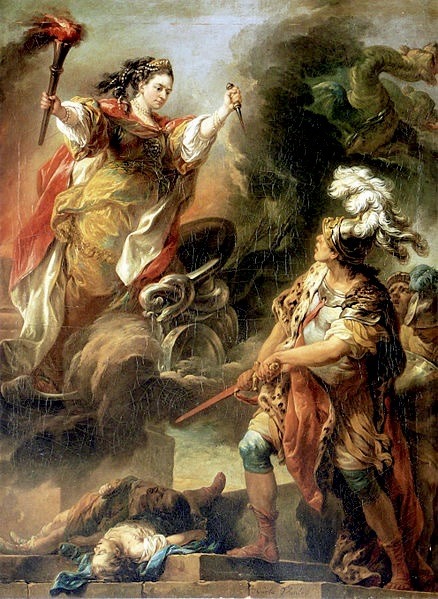
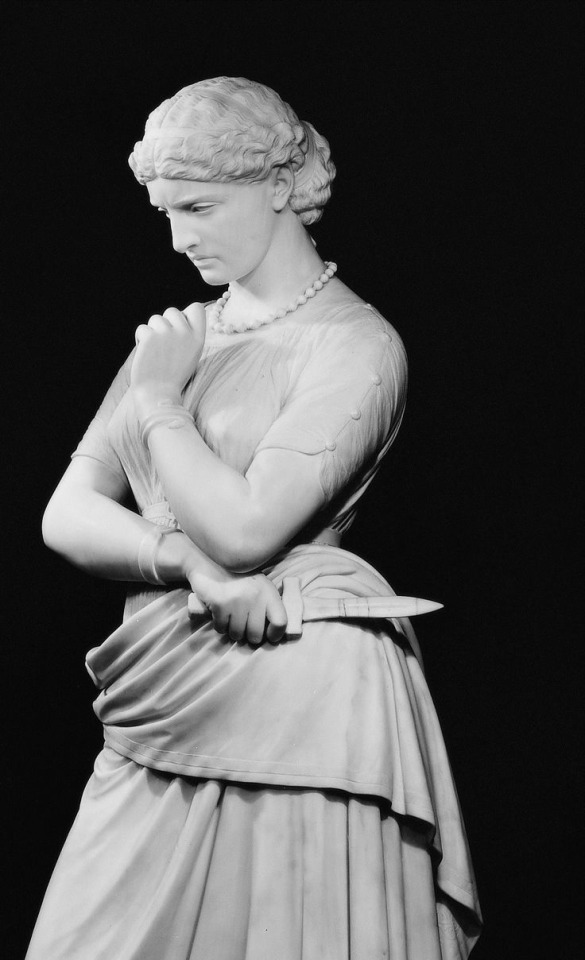
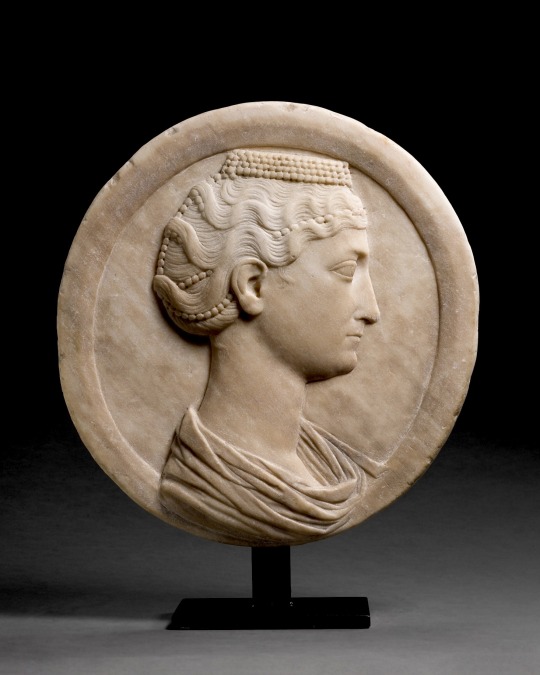
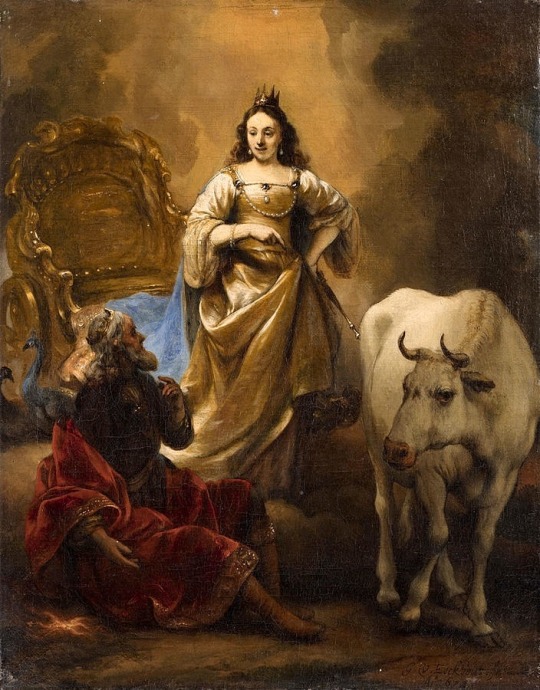
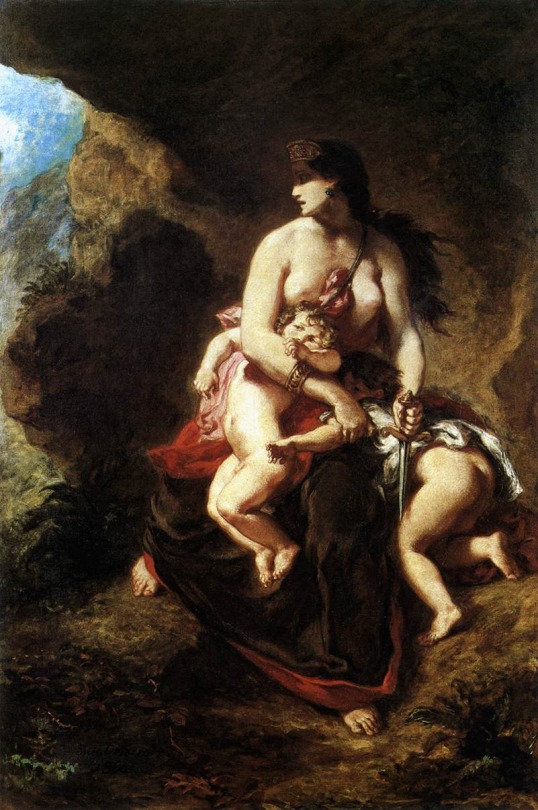
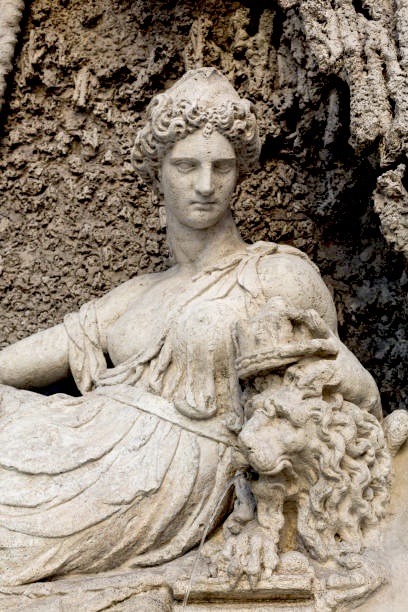
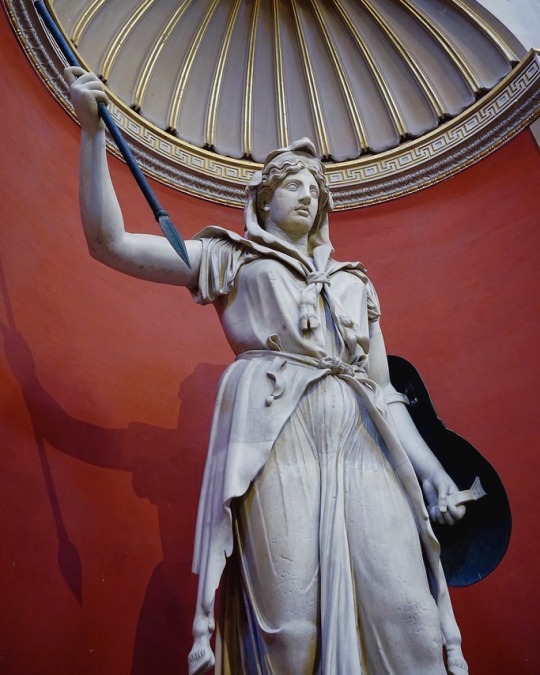
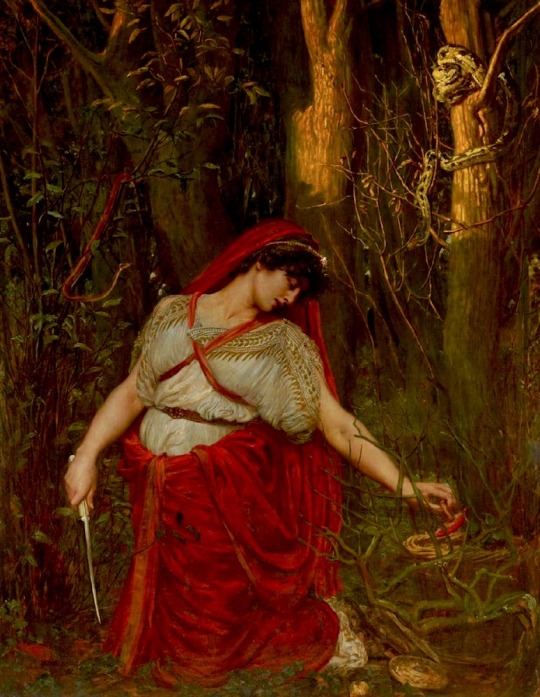
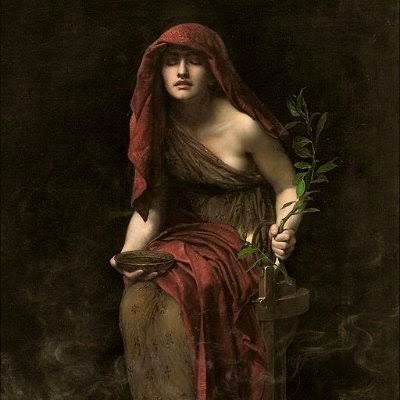
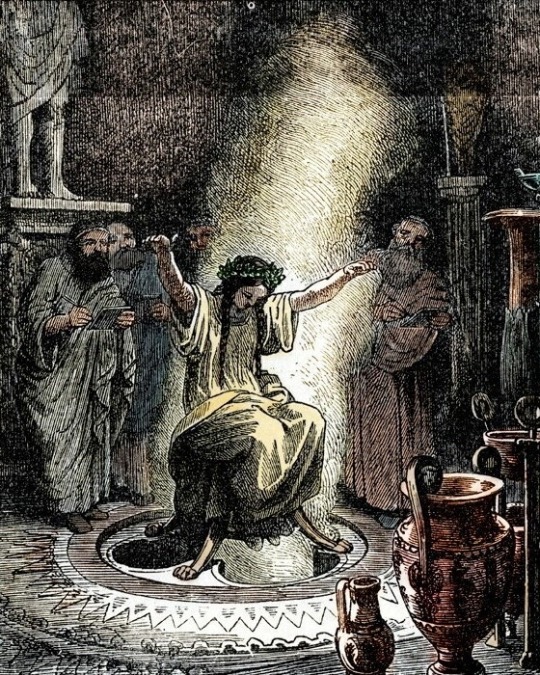
“I wish you a good night, with a Venetian benediction, ‘Benedetto te, e la terra che ti fara!’ — ‘May you be blessed, and the earth which you will make!’ — is it not pretty? You would think it still prettier if you had heard it, as I did two hours ago, from the lips of a Venetian girl, with large black eyes, a face like Faustina’s, and the figure of a Juno — tall and energetic as a Pythoness, with eyes flashing, and her dark hair streaming in the moonlight — one of those women who may be made any thing. I am sure if I put a poniard into the hand of this one, she would plunge it where I told her, — and into me, if I offended her. I like this kind of animal, and am sure that I should have preferred Medea to any woman that ever breathed.”
The mythical and historical allusions:
In Roman myth, Juno was Queen of the Gods as well as a military figure often depicted armed. In Greek myth, Medea was a sorceress who gets revenge against her unfaithful husband through murdering their children and his lover. Although “Pythoness” could refer to demonic witches in other uses, Byron is using it here as another name for Pythia or the Oracle of Delphi, a divine priestess and the most powerful female office in the ancient world.
Faustina is either a reference to the Younger or the Elder. Faustina the Younger was the wife of Marcus Aurelius; he revered her so much that he gave her enormous power, although later historians (probably falsely) accused her of being a murderer and adulteress. Faustina the Elder was the adoptive mother of Marcus Aurelius and was one of the most beloved Roman women in history, whose coinage often features Juno.
Byron's life and writing in context:
When he was living abroad in self-exile, Byron often sought to entertain his friends back home by sharing his adventures in lurid detail. His vivid letters became well-read throughout the 1800s, and are considered some of his best writing. Travel writing and adventure stories were extremely popular in the 19th century, and even most of Byron’s fiction champions these themes. Living abroad and traveling became marketable parts of Byron's celebrity. He blended his own experiences into his work, and chief among these were his romantic experiences.
Shelley once compared Byron to the Greek myth of Circe when writing in a letter about Byron's excessive amount of pets. Circe was known for seducing men and turning them into animals who roamed around her palace. Like a witch or an alchemist, Byron frequently transformed his lovers into characters through his writing. Like countless others, Margarita Cogni was mythically immortalized through the writer's description of her. She and Byron's other Venetian lovers have become part of the wider Romantic era mythology tradition, like the constantly retold tales of Mary Shelley's invention of Frankenstein, Percy Shelley's drowning, and John Keats' love for Fanny Brawne.
By using references to classical women in this letter Byron is not only paying tribute to mythology, history, and the Italian landscape in a way that his foreign audience would find tantalizing, but he is also exploring romanticized notions of classical female beauty which are at turns conventional and unconventional. He channels the gothic sublime through the otherworldly power and danger these women all represent, as well as channeling more traditional concepts of feminine strength rooted in modesty, beauty, and passivity. Byron creates poetic contradictions.
Just as he famously describes himself as “changeable, being everything by turns and nothing long,” he utilizes paradox and inconstance in his writing, such as in this satirical formulation of Margarita Cogni as the ideal lover who is both Goddess and woman, mistress and slave, contemporary and classical, masculine and feminine, wife and adulteress, murderess and murdered.
One can clearly see how this is the same chameolonic, binary-blurring poet who would go on to write the gender-bending themes of Don Juan — “If people contradict themselves, can I / Help contradicting them, and every body, / Even my veracious self?” — and who years beforehand had written She Walks in Beauty — where “all that’s best of dark and bright / Meet in her aspect and her eyes.”
#literature#english literature#lord byron#romanticism#poetry#dark academia#aesthetic#history#mythology#analysis#my analysis#my writing#my essays#byron#poems#letters#women#art#myth#greek#roman#british#english#academia#the romantics#love#romance
64 notes
·
View notes
Text

Hey folks! Just a small reminder that there is ONLY THREE DAYS LEFT to back our campaign for some eerie ancient Greek inspired blankets~
>> CHECK IT OUT HERE !!<
So far we have Eyes of Antiquity unlocked and we're over halfway to unlocking our second blanket, Bed of Hypnos

The campaign also has a lot of other fun myths-related goodies we've been building over time I'm tossing them under the read more since this post is gonna get long otherwise! Consider backing our project and helping us reach our goals!
(PSST we're only a few thousand away from unlocking the second blanket and we've had waay crazier happen in the last few days we can DEFINITELY make this happen!! Any and all boosts really help us out!)
Here's a sneek peek at a few more things we're offering thematically with our blankets!
Queer retellings of Greek Mythology in our ongoing series, Myth Retold
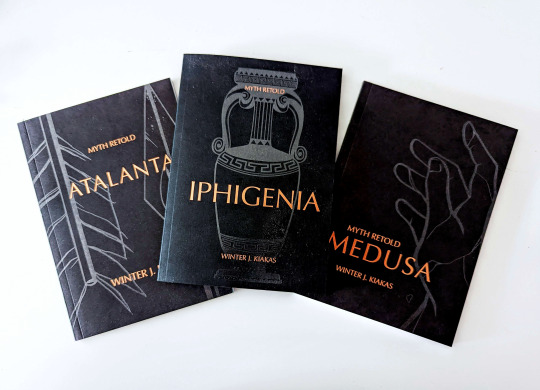
Every single set of Greek myth pins we've made so far...
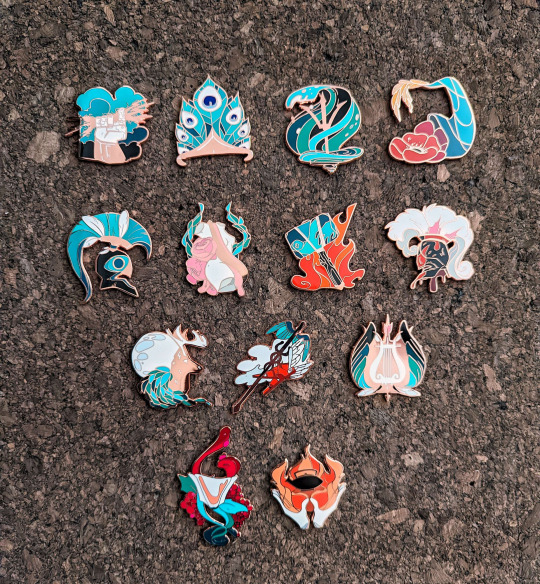


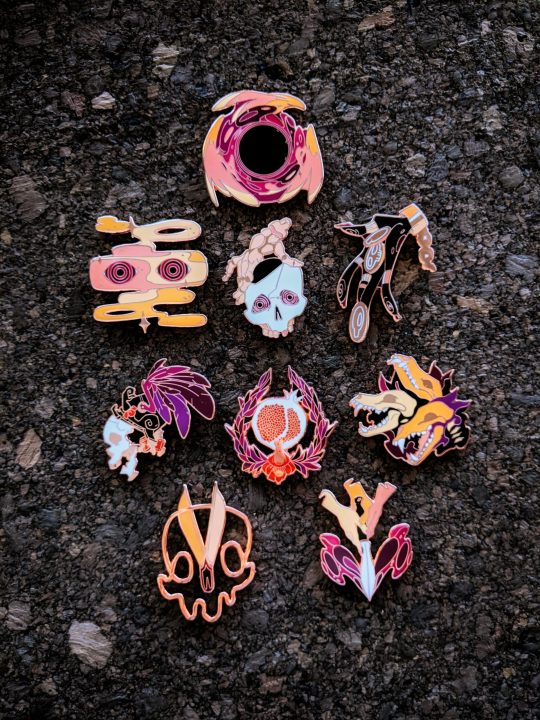
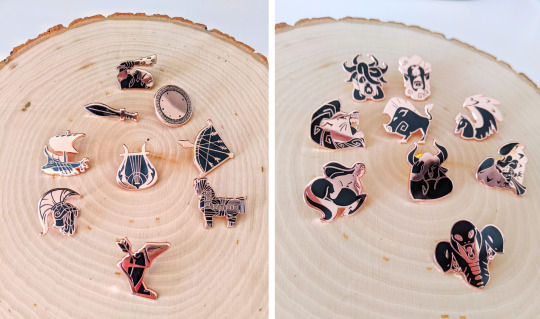
PLUS... non-myths related but blanket-wise... we've also got a bunch of blankets from our original run of The Kings Grave

(But these are also all available on our shop right now too if there's anything here you want divorced from the KS campaign itself!)
484 notes
·
View notes
Text
🥀Book Review: Persephone's Pathway: Wisdom, Magick & Growth by Jennifer Heather
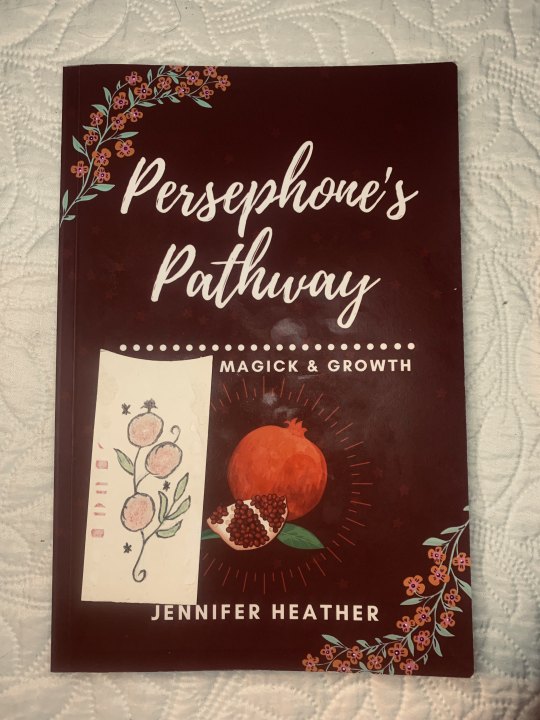
Full Title: Persephone's Pathway: Wisdom, Magick, Growth
Author: Jennifer Heather
Published by: Heather Publishing (seemingly self published) 2020
Good Reads: Link
My Quick Review: ⭐⭐⭐⭐ (4/5) stars.
Persephone’s Pathway which while flawed and at times meandering is perhaps the best resource available for the modern pagan worshipping or working with Persephone and I wholly recommend it.
Official Blurb: Persephone's Pathway is one of balance and duality; embrace the dual goddess archetype of Underworld Queen and Spring Maiden in order to achieve harmony. This book shares the wisdom of Persephone, along with spells and rituals to help you in your daily life. Shadow work exercises encourage you to work with the Underworld aspect of the Dark Goddess, whilst flower magick celebrates the joy and gentleness of the Spring Goddess. Blend the dark and light aspects together to experience how they shine a light on each other in this celebration of wholeness and authenticity.
Personal Reason for Purchasing: Was looking for a pagan/witchy perspective on Persephone and stubbled across this one. (Bought from Amazon UK)

Overview of the book's contents.
Introduction: A solid introduction, focusing on what the purpose of this book will be, and the author’s goals in writing it, namely ‘an exploration of the mythology and Symbolism surrounding Persephone, along with chapters dedicated to a facet of what she can teach us’, ‘both a collection of information and tribute to her’.
Chapter 1: 'Who is Persephone': Introduction to Persephone, her role, dual nature, The Eleusinian mysteries, possible connections to Erishkegal (a mesopotamia goddess originating 4000 BC), and of course the Homeric Hymn to Demeter.
Chapter 2: 'Historic Origins': An exploration of the genesis of Persephone in Mythology, through to the Evolution of her story in present day literature. (A personal highlight).
Chapter 3: 'A Myth Retold': A modern retelling of the hymn to Demeter by the author.
Chapter 4: 'Symbolism': An exploration of the artefacts associated with Persephone, both modern and ancient, the creation of a unique glyph/sigil for Persephone and an extensive and detailed discussion of association/correspondences, some ancient, some contemporary and lastly her common epithets.
Chapter 5: 'Creating an Altar': A collection of suggestions and guidelines on creating your own altar for Persephone and common offerings to gift the Goddess.
Chapter 6: 'Persephone Magick: Begins with a basic beginners to magickal practice, followed by a recipe for a Persephone Anointing oils, a guide to connecting to Persephone, an innovation and an adaption of the Orphic Hymn to Proserpina.

The Seeds of Persephone
A collection of chapters surrounding what the Author considers to be the six core aspects/values which Persephone embodies.
Seed 1: 'Union': Focuses on Shadow-work, divine alignment for body and Spirit union, and includes a spell for Spiritual union of lovers, guidance surrounding meditation, shadow-work rituals, and a recipe for a love attraction oil.
Seed 2: 'Balance': Begins with a discussion of how to, and the importance of maintaining balance in one’s life, including a meandering discussion of grounding, living with the seasons, incorporating nature into your life, meditation, seasonal altars, self-care, massage, and yoga. Lastly it includes recipes for a Persephone Beauty Elixer’ cream/lotion, a medicinal tonic, a spell for resolution, and a spell for making a decision.
Seed 3: 'Intuition': Looks at ways to develop one’s intuition, including an outline for a Persephone focused Lithomancy technique (10 planetary stones, 6 Persephone stones (named for each of the author’s ‘Seeds’: Fertility, Justice, Balance, Union, Sovereignty and Intuition), three tarot spreads and the script for a guided meditation.
Seed 4: 'Sovereignty': Is a discussion of [personal Sovereignty, and self-esteem, with journal prompts. Guidance on enchanting a power talisman, and a spell for protecting personal boundaries.
Seed 5: 'Justice': Focuses heavily on Persephone in her Queen of the Underworld Aspect, touching on several myths in which she acted as a Purveyor of justice, (Orpheus and Psyche, and a discussion on Trust in regards to the Goddess. Followed by Several spells for truth telling, reflection on behaviour and fair resolutions.
Seed 6: 'Fertility': Focuses on Persephone's Spring/Maiden Aspect. Followed by a discussion of Maiden goddesses, Flower Magick, creating Floral elixirs, cleansing sprays, a flower bathing ritual, and spell jars/Witch’s bottles. Followed by the Associations/correspondences and finally a script of a guided meditation, to meet Persephone in her Spring Aspect.
Appendix: The Orphic hymn to Proserpina, translated by Taylor Thomas 1792.

Personal Thoughts and Review.
I’m conflicted about this book. The first half is an excellent primer on Persephone and including her into one’s personal practice however, the second half the ‘Seeds of Persephone’ are at times Meandering, unfocused and clumsy, but there are jewels among the ramblings.
The book appears to be self published, so I’m inclined to be kinder to the Author than I would otherwise be; however, Persephone’s Pathway could really use reformatting (text justified etc), and would benefit immensely from an informed and passionate editor. Nevertheless this book is an excellent edition to the libraries of those of us who work with Persephone.
Aspects in detail.
General content: The first half goes over a lot of content around Persephone, in some detail and is appropriately referenced through allowing the reader to research further. The Second half (the Seeds) is a mixed bag and approaches certain subjects extremely casually, namely Shadow-work and herbal medicine.
Persephone’s correspondences: Primarily contained to Chapter 4, the Correspondences are in depth, reference and diverse. However, there are inaccuracies, the most obvious is a mention of Corn/Maize being cut as a part of the Eleusinian Mysteries. As a New World crop Corn was not in ancient Greece at the time and as such has no historical connection to the Mysteries. From my own understanding the crop cut during the Mysteries was likely Barley, a grain though to have great significance to the Eleusinian Mysteries as a part of the hallucinogenic cocktail thought to be drunk by initiates, barley is also part of the offering given by Oddyseus to summon Persephone (“first with milk and honey, then with sweet wine, then with water; and sprinkle white barley-meal above”).
Rituals and Spells: It’s Always interesting to see another practitioner's approach, and covering a very broad scope although, I wish they were indexed since they appear throughout the book.
Origin Myth retelling: An interesting retelling, possibly my favourite version, however it is not without flaws.
Guided Meditations: Enjoyable and Interesting, these scripts approach many aspects of Persephone’s Mythos.
Journaling Prompts: These appear seemingly at random in the latter half of the book, but are nevertheless thought provoking.
Recommended Reading: While good to see, it is worthy of note that none of these books reference Persephone, Hellenic Polytheism, or Shadow-work. Which are the topics I would like to see additional material given some of my concerns with the book itself.
Bibliography: Extensive and good practice.
The Seeds in Detail.
Given their significance to the book I’ll review these chapters separately:
Union: a clumsy chapter whose advice on Shadow-work is surface level and possibly dangerous for a beginner or someone who is mentally vulnerable. But this chapter does handle the topic of Love workings with the required levity.
Balance: Waffling and honestly feels like filler, of the seeds this one is disappointing and feels like lost potential.
Intuition: a major highlight of the book, a detailed exploration of Lithomancy, well written and thought provoking.
Sovereignty: A good chapter, if a little long winded.
Justice: Spectacular, discussion of Queen Persephone and of how to connect to the Underworld Aspect. A personal highlight.
Fertility: An excellent close to the book but desperately needs reformatting.
Final Thoughts.
I wholly recommend this book especially as a gateway into working with or worshipping Persephone. Despite its flaws, it is the best resource I’ve found on Persephone from a pagan/witch perspective, and my practice is better for reading it.

#🥀Book Review#book review#persephone#persephone worship#persephone deity#persephone goddess#persephone devotee#persephone devotion#paganblr#paganism#pagan witch#hellenic pagan#hellenic books#hellenic gods#pagan books#witchblr#witchcraft#witch book#spirituality#shadow work#greek mythology#mythology#gay witch#gay pagan
43 notes
·
View notes
Text

Enthroned Scythian woman or deity (possibly Tabiti) with a vial and a horseman holding a drinking horn 3rd-2nd C. BCE. The woman/deity sits between an impaled animal skull (on her left) and what appears to be a tree of life (on her right). Fragment of a gold rhyton from a burial mound near the village of Merdzhany, Krasnodar region. H. 13.2cm. State Hermitage Museum.
“…we do not lend the hearth quite the importance that our ancestors did, Greek or otherwise. …The word ‘hearth’ shares its ancestry with ‘heart,’ just as the modern Greek for ‘hearth’ is kardia, which also means ‘heart.’ In Ancient Greece, the broader concept of hearth and home was expressed by the Oikos, which lives on for us today in economics and ecology. The Latin for hearth is focus – which speaks for itself. It is a strange and wonderful thing that out of the words for the fireplace, we have spun “cardiologist’, ‘deep focus’ and ‘eco-warrior.’ The essential meaning of centrality that connects them also reveals the great significance of the hearth to the Greeks and Romans, and consequently, the importance of Hestia, its presiding deity.”
― Stephen Fry, Mythos: The Greek Myths Retold
#hestia#tabiti#scythian#scythian gold#pagan#history#ancient history#etymology#historical linguistics#antiquities#artifacts#museums#antiquity#3rd century bce
183 notes
·
View notes
Note
31) For first time readers to your blog, which three fics would you recommend they read?
Um, probably At the Mercy of the Stars (Feysand), because it’s the fic I’m proudest of at the moment.
Then I’d recommend Would You Like Me on My Knees? bc every girl needs to scratch the beast!rhys itch Scheherazade!Feysand was so fun to write, even if it’s discontinued.
Lastly, A Renaissance Romance. It isn't great quality, but it's the only multichapter I've finished for acotar.
#and the first to post anything on Wattpad#acotar#feysand#scheherazade!feyre#dark!rhys#ancient myths retold#at the mercy of the stars#atmots#it really is important you know I'm a beast!rhys girlie before you dive too deep
13 notes
·
View notes
Note
Um hi, could I request Morpheus falling in love headcanons with a immortal reader? Please and thank you!
HELLO! Thanks for sending me an ask!
I will do my best, hopefully this is close enough?
I see what everyone has done w immortal reader inserts (gods, dreams, witches (see @cuckoo-on-a-string ‘s hello Mr monster for that btw))
And I raise yall
What if reader is a story? A story that has been told over and over for countless generations, until the story takes shape and becomes… you?
You have been in every village, city, island, forest, hearth, and crossroads that has whispered your name or retold your tale
You have a Wikipedia page that tracks every mention of you in books written across the world, in every decade, for hundreds of years
Dream is the Prince of Stories, but as much as he can create stories, people ultimately create them and make them (and you) immortal
Morpheus is a dick, and prideful, and pretty self absorbed sometimes, yes, but he has a true respect and affection for stories/art/culture/dreams
Maybe that’s how he falls in love with you
Maybe he sees you and is fascinated by a story as long lived and complicated as you, and the more he talks to you, entertains you in the Dreaming
The more he understands why you, out of so many, are as ancient as people are
Maybe you inspire him like a muse does a painter
Maybe he seeds bits of your story throughout the dreaming to extend your (already very long) life span
Maybe you show him your affection back by including a version of him in your story
The handsome dark god, the gifted musician, the poet, Morpheus as Morpheus, not just an Endless
You send each other love letters back and forth throughout space and time, mailing them through urban legends, folktales, bedtime stories, indie movies inspired by a dream, books inspired by a newly-resurfaced version of your myth
(Thank you again for your ask! Send me another if you’d like)
#the sandman#sandman#Dream of the endless#lord morpheus#Morpheus#dream of the endless x you#dream of the endless x reader#lord morpheus x you#lord morpheus x reader#Morpheus x reader#Morpheus x you#1k headcanon game
120 notes
·
View notes
Text
Finally posted the first chapter of my reimagining of the Iliad on AO3 and other sites, including Wattpad. Check it out !! You won't regret it, I promise
The whole story is written, and it uploads weekly after editing
Title : Silvertongue
Summary :
The tale of Odysseus is one that has been retold over countless millennia, from the mouths of poets, of authors, and historians and storytellers. But has it ever been told from the mouth of the man himself ?
This is a familiar tale, and a familiar story - the Iliad, entombed in history as ancient as the land of Greece. This is the story of the Iliad as told from the mouth of the man who made it all happen - from the mouth of the Silver-tongued prince of Ithaca. From the mouth of Odysseus
Watch as he navigates the cruelty of the war, as lovers are ripped from each other, daughters die, heroes fall, and he survives it all - armed with a quick mind and a sharp tongue.
This is not a story of heroes and gods and myth
This is a story of love, of loss and war and death
This is the story of the most human of the Grecian heroes
Genre : Tragedy, Romance, War, Historical Fiction
Link :
AO3 : https://archiveofourown.org/works/51546121
Wattpad : https://wattpad.com/story/356062564-silvertongue
RoyalRoad : Pending
#lgbt#gay#angst#lgbtq#odysseus#diomedes#homers iliad#the iliad#reimagined#achilles#patroclus#patrochilles#angst and hurt/comfort#angst and humor#odydio#odypen#penelope
31 notes
·
View notes
Text
Game of Thrones Masterlist
A collection of one-shots dedicated to George R.R. Martin’s world of ‘A Game of Thrones’. The tales of legend have entertained the world for years. This collection contains the romance retold from the Eddas, the secret tales of ‘A Game of Thrones’ and its ancient world. Following the deeds of powerful men and women such as Aegon the Conqueror, The Kingslayer, and even the Green Queen, and filled with a host of fantastic creatures - dragons, basilisks, etc. - and objects containing myth - Dark Sister, Widows Wail, etc. - that will conjure up a world of heroism and romance that will enthrall you.
𝐑𝐈𝐒𝐄 𝐎𝐅 𝐓𝐇𝐄 𝐃𝐑𝐀𝐆𝐎𝐍

Obsession - maegor the cruel x stark!OC (COMING SOON)
Just His Servant - maegor the cruel x servant!OC (COMING SOON)
The Rogue - aegon the conqueror x dragon rider!OC (COMING SOON)
Traveller - aegon the conqueror x nomad!OC (COMING SOON)
Warlord - visenya t. x dragon rider! queen!OC (COMING SOON)
𝐇𝐎𝐔𝐒𝐄 𝐎𝐅 𝐓𝐇𝐄 𝐃𝐑𝐀𝐆𝐎𝐍

Boneless - daemon t. x crippled!niece!OC (COMING SOON)
Childhood - daemon t. x servant!OC (COMING SOON)
I’m A Poet - aegon ii t. x niece!strong!OC (COMING SOON)
The Flower - aegon ii t. x OC ModernAU (COMING SOON)
Pretty Questions - aemond t. x lannister!OC (COMING SOON)
Like A Cat - aemond t. x stark!OC (COMING SOON)
Secret - aemond t. x neice!OC x aegon ii t. (COMING SOON)
Bones - alicent h. x ghost!fem!celtigar!OC (COMING SOON)
Prince - alicent h. x prince!targaryen!OC (COMING SOON)
Diamonds - rhaenyra t. x lannister!fem!OC (COMING SOON)
𝐀 𝐒𝐎𝐍𝐆 𝐎𝐅 𝐈𝐂𝐄 𝐀𝐍𝐃 𝐅𝐈𝐑𝐄

Queen - daenerys t. x baratheon (lannister)!OC
The young queen, Mercia Baratheon, is the last living heir to King Robert after all three of her siblings die horrible deaths. As the Seven Kingdoms are on the brink of collapse, Mercia does all she can to hold it all together - though struggles arrive when the Long Night draws near, and The Dragon Queen comes for her throne. But perhaps there is a compromise they can arrange?
A Caged Bird - viserys t. x slave!OC (COMING SOON)
Unsteady - jaime l. x targaryen!OC (COMING SOON)
Sorcery - cersei l. x witch!OC (COMING SOON)
#daenerys x reader#aemond x reader#aegon ii x reader#aegon i x reader#alicent x reader#jaime x reader#fem x fem#fem x male#oneshot#masterlist#collection of oneshots#imagines#game of thrones#house of the dragon#rise of the dragon#fanfiction#romance
88 notes
·
View notes
Text
Part 2 of 7 @endlesshistoriesfest

The Birth of Guilt (or Why Delight Became Delirium)
In which humanity changes, and Delight becomes Delirium.
Rated T | 401 Words | A03 | Masterpost | CW: Religious Guilt/Trauma
This story was inspired by Leonard Schlain’s The Alphabet Versus the Goddess: The Conflict Between Word and Image, in which he theorizes that written language fundamentally changed how human minds work, allowing patriarchal ideas to flourish. In Chapter 6, “Cuneiform/Marduk” he states, “The Seven Tablets of Creation replaced previous creation myths around 1700 B.C. and was recited every spring in Babylon for the next thousand years as the most plausible explanation for how the physical world came into existence.... Babylonians embracing this myth would forever be burdened by guilt; they owed their very existence to the martyrdom of a god.” This myth, along with the Code of Hammurabi, Schlain argues, caused Babylon’s cultural and mental shift towards patriarchal principles and biases.
Dream's appearance in this ficlet is a callback to Delight's brief appearance in Sandman: Overture.
The illustration is influenced by ancient Babylonian relief carvings & sculpture.

The people didn’t want to believe the story, but it could not be denied. It was clearly etched in stone tablets. That myth was now unchangeable, immoveable, same as Hammurabi’s laws that now ruled their daily lives. Every year, the story was read aloud, in case they had forgotten. The weight of those words seemed to press down on them, heavy as the stone on which it was written, causing a burdensome new emotion, for which they had no name. (But one was guilt, and the other shame.)
As Babylon’s empire spread, the myth was told and retold to more and more people, from Hittites to Aryans and beyond. As they accepted its authority,, they fell under its heavy psychological weight. And as their burden grew, their joy fled from them.
Wherever they may seem to be, the Endless are always bound to those they serve. Delight was walking in her garden, when suddenly she trembled and so did the ground beneath her. Something was shifting. And somehow it was her.
In the chaos of the moment, a familiar voice called out to her: “ Delight? ”
“I can’t come right now,” she rasped. “I’m changing. I’m sorry.”
“... changing? ” Dream’s voice echoed, and then she was alone again.
Delight cried out. She fell to her hands and knees on the soft moss. Beneath her, it began to dissolve. Blooms fell with petal-soft sounds. Something twisted and broke inside her. Pain screamed through her and she screamed, loud and wordless.
When the biting pain had passed, Delirium looked up with eyes that now were of two different colors beneath the sheen of her tears. She saw her garden falling into decay, everything dying, dropping, morphing into nonsense shapes and never-before-seen colors.
She stood and looked around. Her realm was no longer a garden of delight, and she was someone else.
As Delirium stood on wobbly legs, she sprouted wings to keep her balanced. She took a step and then another, wings fluttering, hurrying her along. She couldn’t think of what she’d just been doing. Or why she’d stopped. But she supposed it must not be important, if she couldn’t recall. Giggling, she leapt into the air, letting her wings carry her. Iridescent bubbles of all shapes and sizes rose with her into the maelstrom of color that was the sky.
She was Delirium. This was her Realm. She was herself and she was home.
#EndlessHistoriesFest2024#EHF2024#delirium of the endless#fan art#historical au#the sandman comics#sandman ficlet#ink drawing#goblininawig
9 notes
·
View notes